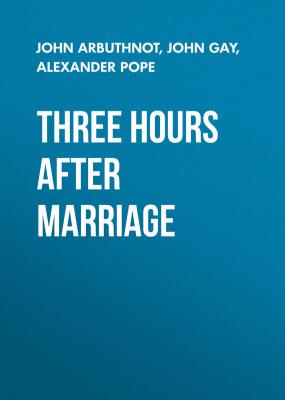Three Hours after Marriage. John Gay
Читать онлайн.| Название | Three Hours after Marriage |
|---|---|
| Автор произведения | John Gay |
| Жанр | Зарубежная классика |
| Серия | |
| Издательство | Зарубежная классика |
| Год выпуска | 0 |
| isbn | http://www.gutenberg.org/ebooks/37667 |
Supplement. 1717, "Mantegers" (OED, mantegar, a kind of baboon).
191 s. d. leap from their places. Idea from Ravenscroft's The Anatomist: cf. n. to 215.
199 Come we may (5th line on page). 1717, "Come we now" – perhaps
"may" is a misreading.
Epilogue.
sound in living. Perhaps another misreading: 1717, "and" for "in."
viol. 1717, "vial." Perhaps another misreading.
Key.
212 knights of the shires, who represent them all. Paraphrase of a line in Dryden's epilogue to The Man of Mode: a mark of literacy in the anonymous writer of our Key.
Heautontimerumenos. Self-tormentor – title of a play by Terence.
213 another eminent physician's wife … shall be nameless. Contemporary gossip said that the wife of Dr. Richard Mead was meant: Parker, less considerate than the gentlemanly author of our Key, uses her name, and in Breval (p. 15) Mrs. Oldfield is made to wish that she had not "mimick'd Mrs. M – d" in her role as Mrs. Townley. But it seems likely that any mimicry would be in the mind of the audience rather than in Mrs. Oldfield's performance, or for that matter, the intention of the authors.
214 Marriage not to be undertaken wantonly. The Key is incorrect in citing the Jonson play; see note to p. 140, above.
215 letters … Cocu imaginaire. None of our Key-writer's adducings of Molière is really in point. The hint for the letters came from Act V of anon., The Apparition, acted twice in 1713. The same play has an intriguing valet named Plotwell; here our authors found the name for one of their gallants – Underplot was a happy invention of their own.
Lubomirski … in Lopez de Vega. Parker (p. 9) is correct in tracing this impersonation of Plotwell's to Ravenscroft's The Anatomist, or the Sham Doctor; the same farce suggested the anxiety of the disguised gallants at the proposals to dissect them in Act V. Ravenscroft's play, first acted in 1696, was popular well into the 18th century and would be well known to the audience. No doubt our authors expected their play to be found infinitely funnier than Ravenscroft's in the comparable parts. It is.
Theatre Italien. Parker (p. 14) says more explicitly that the mummy-crocodile scene is "all stole from a farce" in this collection. Gherardi, vol. VI, does have a farce of the title cited but the only trace of it in Three Hours occurs in the brief joke on Antony and Cleopatra that Townley and Plotwell share on p. 185.
A
SUPPLEMENT
TO THE
WORKS
OF
ALEXANDER POPE, Esq;
CONTAINING,
Such POEMS, LETTERS, &c.
As are omitted in the Edition published
by the Reverend Doctor Warburton:
With the COMEDY of the
THREE HOURS after MARRIAGE;
And a KEY to the LETTERS:
To which is added, (not in the London Edition)
A KEY to the THREE HOURS after
MARRIAGE,
And a LETTER giving an Account of the
Origin of the Quarrel between CIBBER,
POPE, and GAY.
DUBLIN:
Printed for W. WHITESTONE, opposite Dick's Coffee-House, in Skinner-Row.
M.DCC.LVIII.
Three Hours after
MARRIAGE:
A
COMEDY.
Rumpatur, quisquis rumpitur invidia. MART.
ADVERTISEMENT
It may be necessary to acquaint the reader, that this play is printed exactly as it is acted.
I must farther own the assistance I have receiv'd in this piece from two of my friends; who, tho' they will not allow me the honour of having their names join'd with mine, cannot deprive me of the pleasure of making this acknowledgment.
JOHN GAY.
PROLOGUE
Authors are judg'd by strange capricious rules,
The great ones are thought mad, the small ones fools.
Yet sure the best are most severely fated,
For fools are only laugh'd at, wits are hated,
Blockheads with reason, men of sense abhor;
But fool 'gainst fool is barb'rous civil war.
Why on all authors then should critics fall?
Since some have writ, and shewn no wit at all.
Condemn a play of theirs, and they evade it,
Cry, damn not us, but damn the French that made it;
By running goods, these graceless owlers gain,
Theirs are the rules of France, the plots of Spain:
But wit, like wine, from happier climates brought,
Dash'd by these rogues, turns English common draught:
They pall Moliere's and Lopez sprightly strain,
And teach dull Harlequins to grin in vain.
How shall our author hope a gentle fate,
Who dares most impudently – not translate.
It had been civil in these ticklish times,
To fetch his fools and knaves from foreign climes;
Spaniards and French abuse to the worlds' end
But spare old England, lest you hurt a friend.
If any fool is by your satire bit,
Let him hiss loud, to show you all – he's hit.
Poets make characters as salesmen cloaths,
We take no measure of your fops and beaus.
But here all sizes and all shapes ye meet,
And fit yourselves – like chaps in Monmouth-street._
Gallants look here, this[B] fool's cap has an air –
Goodly and smart, – with ears of Issachar.
Let no one fool engross it, or confine:
A common blessing! now 'tis your's, now mine.
But poets in all ages, had the Care
To keep this cap, for such as will, to wear;
Our author has it now, for ev'ry wit
Of course resign'd it to the next that writ:
And thus upon the stage 'tis fairly[C] thrown,
Let him that takes it, wear it for his own.
[B] Shews a cap with ears.
[C] Flings down the cap and
Exit.
Dramatis Personæ.
MEN.
FOSSILE,} Mr. Johnson.
POSSUM,} Doctors. Mr. Corey.
NAUTILUS,}
